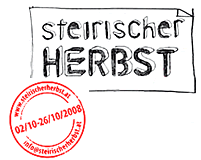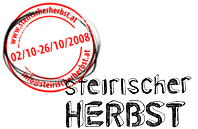Workshop III
Record of downfall
Writing as political act
20/10 – 25/10/2008
By Edith Draxl (A)
With Helgard Haug (Rimini Protokoll) (D), Ulrich Peltzer (D), René Pollesch (D), Uwe Schutte (D) & Stefanie Wenner (D)
In German language
We live in realities that are fragmented and distorted by the
media and that increasingly cause the subject to disappear. Political
conditions are increasingly becoming de-politicised. The privatisation
of politics by no means brings the individual additional room for
manoeuvre, but rather the very opposite. As a result, art that sees
itself as a place of freedom in bourgeois tradition, is being
questioned and challenged. No surprise that art is currently becoming
political once again.
The workshop examines this process for artistic forms and working
situations whose fundamental medium is language. Language generates and
obfuscates political circumstances. In the field of politics it serves
the purpose of agitation and manipulation, to assert lobbyists’
interests. How can and should ‘language artists’ react – is there a
different way out to mere deconstruction of language and, associated
with this, mere agitation, the absolution of mere rhetoric? How can the
individual locate itself in this field? Does the subject that struggles
for freedom still exist, or has it disintegrated and, with it, any kind
of narration? But what, then, are we fighting for in the
re-politicisation of art? What about power – the central category of
politics? Do not all language-critical and subject-critical discourses
and positions serve to mask ###
power, thus making them nothing more than
its servants? The workshop focuses on these and other questions – associative, fragmentary and questioning.
Co-produced by steirischer herbst & uniT Graz
Edith Draxl studied German
studies, theology and psychology. After gaining work experience in
education and psychotherapy, began working in the cultural sector.
First directing work and teaching posts, then founded uniT in 2000. In
this context, development of models of author promotion with an
emphasis on drama.
Helgard Haug studied at
Giessen’s Institute of Applied Theatre Studies. She works with Stefan
Kaegi and Daniel Wetzel in various constellations under the Rimini
Protokoll label. Among her plays, “Shooting Bourbaki” received the
NRW-Impulse-Price in 2003, “Deadline” (2004) and “Wallenstein – eine
dokumentarische Inszenierung” (2006) were invited to the Berliner
Theatertreffen, and “Schwarzenbergplatz” was nominated for the Austrian
Nestroy theatre prize in 2005. “Mnemopark” received the jury’s prize at
Berlin’s “Festival Politik im freien Theater” in 2005 and “Karl Marx:
Das Kapital. Erster Band” won both the audience prize at the Stücke07
festival in 2007 and the 2007 Mülheimer Dramatiker-Preis at the
Stücke07 festival. In November 2007, Haug, Kaegi and Wetzel received a
special prize of the German theatre award “DER FAUST”, and they were
awarded the European Theatre Prize, in the New Realities category, in
Thessaloniki in April 2008.
Ulrich Peltzer moved to Berlin
in 1975, where he studied philosophy and social philosophy until 1982,
graduating in psychology. Since then he has worked as a freelance
writer and has ###
published five books. Four deal with his experiences in
Berlin and one in New York. A characteristic feature of
Peltzer’s city novels is that the author does without a conventional
realistic description of the outside world. Instead, the focus is on
reproducing the protagonists’ processes of consciousness. He has
received the following prizes, among others: the Bertelsmann
scholarship at the Ingeborg-Bachmann competition in Klagenfurt in 1992,
the Berliner Literaturpreis from the Stiftung Preußische Seehandlung in
1996, the Anna-Seghers prize in 1997, the SWR-Bestenliste prize in
2000, the Niederrheinischer Literaturpreis of the city of Krefeld in
2001, the Bremer Literaturpreis in 2003, and the Berliner
Literaturpreis for his complete works in 2008.
René Pollesch studied with
Andrzej Wirth and Hans-Thies Lehmann at the Institute of Applied
Theatre Science in Gießen from 1983 to 89. He took part in various
projects supervised by the visiting professors Heiner Müller, George
Tabori and John Jesurun. After several sojourns at German theatres,
including Theater am Turm in Frankfurt am Main, Pollesch received a
working scholarship at the renowned Royal Court Theatre in London in
1996. A scholarship from Akademie Schloss Solitude in Stuttgart
followed in 1997. In the 1999/2000 season he was director at the
Luzerner Theater, and in autumn 2000 at the Deutsches Schauspielhaus in
Hamburg. Since 2001 he has headed the small Prater der Volksbühne
theatre (part of Volksbühne am Rosa-Luxemburg-Platz in Berlin). René
Pollesch was awarded the Mülheimer Dramatikerpreis in 2001. In 2002, a
critics’ survey held by the Theater heute magazine voted René Pollesch
best German playwright for his “Prater-Trilogie”. In 2006, René
Pollesch received the Mülheimer Dramatikerpreis for his play
“Cappuccetto Rosso”, in the Volksbühne Berlin / Salzburger Festspiele
production, for which he also received the audience prize. [1] He was
awarded the Nestroy theatre prize for Best Play for “Das purpurne
Muttermal” in 2007.
###
Stefanie Wenner studied philosophy, sociology, art history and comparative literature in Cologne and Berlin. Assistant to the director at the Zentrum für Literaturforschung in Berlin.
In addition to her research in aesthetics and politics, she is
co-founder of the »Diskursive Poliklinik«, that focuses on
performativity research (science) with the means of art. She is
currently working as a script editor at HAU in Berlin.
»Download application form
»herbst Academy: Invitation

